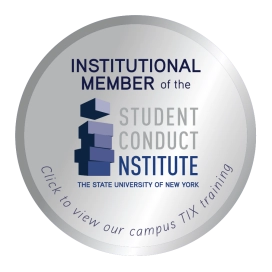Online Training Modules
Student and Employee Mandatory Training
Niagara University is committed to providing an environment that values all individuals and respects the dignity and rights of all members of our campus community. Since 2017, NU has provided required online training to the entire campus, including faculty, staff, employees and students. These trainings help NU to meet the high standards of New York State’s sexual harassment prevention laws, “Enough is Enough” legislation and federal Title IX laws.
- All training is completed through Get Inclusive.
- Training invitations for each year are emailed in September/October with reminders to be delivered through the end of semester.
Please know that the OIE is available to work with you and your department to facilitate follow-up discussions based on the content of this online course, or to answer any questions about the material.
OEI Annual Educational Award
Each spring the Office for Inclusive Excellence (OIE) will choose a local organization or club that exemplifies a commitment to educating our youth on matters involving discrimination, sexual assault or intimate partner violence. The OIE will donate these educational funds directly to the organization/club or through one of the group’s fundraising events.
The current annual scholarship amount is $400.
OIE Annual Educational Award-recipients:
- 2020 – Niagara University’s Take Back the Night
- 2019 – Pinnacle Community Services (Red Flag Campaign)
- 2018 – YWCA of the Niagara Frontier (Domestic Violence and Sexual Assault Prevention Education Initiative)
- 2017 – The Teal Project (Sexual Assault Awareness Walk-a-thon)
If you would like to nominate an organization/club for the OIE educational award, please contact OIE with a summary explaining why the group is deserving of the award and what the funds will be used for.
Title IX Training
Standard Compliance Learning Path
Learners who follow this path will complete over eight hours of training that cover all topics required by the Violence Against Women Act (VAWA) amendments to the Clery Act. These federal requirements apply annually for officials who may be involved in receiving, investigating or adjudicating a case of sexual or interpersonal violence. These requirements run alongside any training requirements mandated under the 2020 Title IX Final Rule.
- CAS Standards: Student Conduct Programs
- CAS Standards: Sexual Violence Related Programs and Services
- What is Affirmative Consent?
- Privacy, Confidentiality & Privilege in Disclosures of Sexual and Interpersonal Violence
- Cultural Relevance, Inclusiveness, and Responding to Sexual and Interpersonal Violence on Campus
- Due Process Part One: Theory and History
- Due Process Part Two: Application
- Title IX Final Rule Basics
- Supportive Measures in Response to Reports of Sexual and Interpersonal Violence
- No Contact Orders, Emergency Removal, and Interim Suspensions
- Evidence in the Student Conduct Process
- Effective Interviewing of Parties and Witnesses
- Pre-hearing Preparations
- Law & the Hearing Panel
- Decision-Writing Basics for Conduct Hearings
- Appeals in Student Conduct Proceedings
- Disability Law in Student Conduct Proceedings
- The Neurobiology of Sexual Assault Trauma: Part 1
- Neurobiology of Sexual Assault Trauma – Part 2: When Attack Is Detected or Stress Kicks In
- Neurobiology of Sexual Assault Trauma – Part 3: Reflexes and Habits
Title IX Compliance Learning Path:
Learners who follow this path will complete over eight hours of training that cover all topics required for Title IX Coordinators, Investigators, and Decisionmakers under the 2020 Title IX Final Rules, and all topics required for officials who may be involved in receiving, investigating or adjudicating a case of sexual or interpersonal violence annually by guidance under the Violence Against Women Act amendments to the Clery Act.
Note that this path may not cover all training topics required by your state’s law.
- Title IX Final Rule Basics
- Due Process Part One: Theory and History
- What is Severe, Persistent, and Objectively Offensive Title IX Sexual Harassment?
- What is Affirmative Consent?
- Privacy, Confidentiality & Privilege in Disclosures of Sexual and Interpersonal Violence
- Cultural Relevance, Inclusiveness, and Responding to Sexual and Interpersonal Violence on Campus
- No Contact Orders, Emergency Removal, and Interim Suspensions
- Legal Framework for Understanding Conflicts of Interest and Bias
- Understanding the Investigative Report Template for Investigations of Title IX Sexual Harassment
- Effective Interviewing of Parties and Witnesses
- Collecting and Understanding Specialized Evidence
- Virtual Hearing Technology
- Relevance and Decorum in a Title IX Hearing
- Determining Relevance in Title IX Hearings
- Cross Examination in a Title IX Hearing
- The Neurobiology of Sexual Assault Trauma: Part 1
- Neurobiology of Sexual Assault Trauma – Part 2: When Attack Is Detected or Stress Kicks In
- Neurobiology of Sexual Assault Trauma – Part 3: Reflexes and Habits

